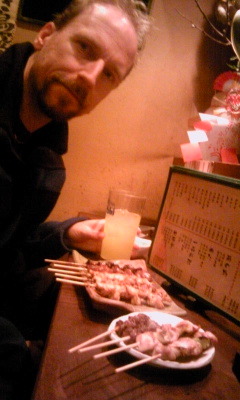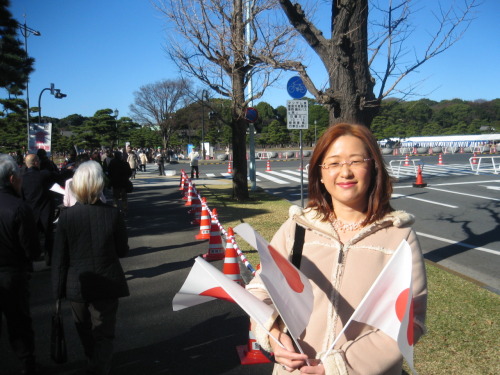Blog Post
The Wrong Reason Not to Go to Japan: Radiation
wastholm.tumblr.com/post/5638599604/the-wrong-reason-not-to-go-to-japan-radiation, posted 2011 by peter in fukushima health japan jpquake tokyo travel
Kyodo News tweeted this morning that the number of foreign visitors to Japan dropped 62.5% in April. This, if true, is a shame, because the ailing Japanese economy (which was already in terrible shape before the earthquake) really could do with the money those visitors would have spent. A lot of them probably stayed away out of a fear of radiation. That’s worse, because then they stayed away unnecessarily.
Most foreign visitors go to Tokyo or Kyoto. Both these places are well out of the way of the radiation from the Fukushima power plant.
But haven’t elevated levels of radiation been detected in Tokyo? — Yes, but the levels are still much much lower than, for example, what you would be exposed to on a perfectly typical flight on a perfectly normal passenger plane. See, for example, this graph showing the levels of radiation detected throughout a business trip to Japan. The radiation in Tokyo is barely noticeable next to the huge spikes during the times the traveler was sitting on a plane. And those spikes would of course have looked the same if he had flown somewhere else instead.
If you don’t feel comfortable going to Japan right now after all that has happened there recently, sure, don’t go. (But do go later — Japan is an absolutely fascinating country.) Just don’t stay away because you’re afraid of being exposed to radiation. Living on Earth, we’re exposed to radiation all the time, from both natural and artificial sources, and a visit to, say, Tokyo would barely register next to everything else that you are already exposed to and that is very unlikely to have any impact on your health. For a bit of perspective, here’s a nice visualization of radiation from various sources.
Blog Post
The Wrong Reason Not to Go to Japan: Radiation
wastholm.tumblr.com/post/5638599604/the-wrong-reason-not-to-go-to-japan-radiation, posted 2011 by peter in fukushima health japan jpquake tokyo travel
Kyodo News tweeted this morning that the number of foreign visitors to Japan dropped 62.5% in April. This, if true, is a shame, because the ailing Japanese economy (which was already in terrible shape before the earthquake) really could do with the money those visitors would have spent. A lot of them probably stayed away out of a fear of radiation. That’s worse, because then they stayed away unnecessarily.
Most foreign visitors go to Tokyo or Kyoto. Both these places are well out of the way of the radiation from the Fukushima power plant.
But haven’t elevated levels of radiation been detected in Tokyo? — Yes, but the levels are still much much lower than, for example, what you would be exposed to on a perfectly typical flight on a perfectly normal passenger plane. See, for example, this graph showing the levels of radiation detected throughout a business trip to Japan. The radiation in Tokyo is barely noticeable next to the huge spikes during the times the traveler was sitting on a plane. And those spikes would of course have looked the same if he had flown somewhere else instead.
If you don’t feel comfortable going to Japan right now after all that has happened there recently, sure, don’t go. (But do go later — Japan is an absolutely fascinating country.) Just don’t stay away because you’re afraid of being exposed to radiation. Living on Earth, we’re exposed to radiation all the time, from both natural and artificial sources, and a visit to, say, Tokyo would barely register next to everything else that you are already exposed to and that is very unlikely to have any impact on your health. For a bit of perspective, here’s a nice visualization of radiation from various sources.
Bookmark
Kan Told to Decentralize Japan on Tokyo Annihilation Danger - Bloomberg
www.bloomberg.com/news/2011-03-27/kan-told-to-decentralize-japan-as-aide-says-big-one-may-annihilate-tokyo.html, posted 2011 by peter in business finance history japan jpquake people politics tokyo toread
Two days before Japan suffered its record earthquake and a devastating tsunami on March 11, Prime Minister Naoto Kan appointed [Takayoshi] Igarashi as a Cabinet adviser on coping with Japan’s population decline and rural-region decay. Igarashi says the disaster has made clear the nation must reduce the role of its capital city to avert an even greater catastrophe.
“I told the prime minister that nationwide dispersal is the first thing we need to do as we rebuild,” Igarashi, a professor at Hosei University in Tokyo, said in an interview after meeting with Kan last week. “We have no idea when the big one’s going to hit Tokyo, but when it does, it’s going to annihilate the entire country because everything is here.”
Bookmark
Photo gallery: Tsukiji Market, one week on - Time Out Tokyo
www.timeout.jp/en/tokyo/feature/2602/Photo-gallery-Tsukiji-Market-one-week-on, posted 2011 by peter in food japan jpquake msm tokyo
Over in the vegetable section, boxes of fresh tomatoes, daikon, cabbages and citrus fruit are stacked high, awaiting delivery. At the shops surrounding the main market, meanwhile, there's a real abundance of food on sale. The contrast with the 'trapped and starving in post-tsunami Tokyo' stories doing the rounds in tabloid newspapers overseas is pretty striking: if this is scarcity, we'd be interested to know what excess looks like.
Blog Post
Having Some Yakitori in Shinjuku, Tokyo
wastholm.tumblr.com/post/2608172626/having-some-yakitori-in-shinjuku-tokyo, posted 2011 by peter in food japan tokyo
Blog Post
Japanese Emperor’s Birthday
wastholm.tumblr.com/post/2466796730/japanese-emperors-birthday, posted 2010 by peter in japan tokyo travel
Blog Post
A Meatlover’s Dinner
wastholm.tumblr.com/post/2430716815/a-meatlovers-dinner, posted 2010 by peter in food japan tokyo
Bookmark
WiFi in Tokyo: Where to get it | CNNGo.com
www.cnngo.com/tokyo/play/why-oh-why-no-wifi-tokyo-357695, posted 2010 by peter in free japan list tokyo travel wifi
Tokyo's utter lack of WiFi hotspots is a constant thorn in the side of wired warriors, but here's a list of spots you can actually find some signal to mooch.
Bookmark
Ride with the Internet as Tokyo taxis get Wi-Fi | CNNGo.com
www.cnngo.com/tokyo/life/ride-internet-tokyo-taxis-get-wifi-738435, posted 2010 by peter in business free japan tokyo travel wifi
Mobile phone giant NTT Docomo and Tokyo taxi service Tokyo Musen have teamed up to provide that rarest of things in Tokyo -- free Wi-Fi.
Some 820 Tokyo taxis have been installed with the technology on a trial basis until the end of March 2011 and 100 of the taxis also have PSP Go devices on board so that users can play games while going for a ride.
The trial aims to find out what the demand is for Wi-Fi while on the go, and could see the service expand after March.
Bookmark
What the Dickens! Home
www.whatthedickens.jp/, posted 2010 by peter in beer food japan todo tokyo
British pub just 3 minutes from Ebisu station.Wide selection of British and other beers both bottled & draught. Real Ale and Cider on tap! If you want something fanicier our experienced barstaff are happy to make it.
Live music nightly. Enjoy listening to local bands playing 'live' on the Dickens stage! From Jaz to Rock, oldies and new, check out our music schedule.
|< First < Previous 21–30 (41) Next > Last >|



![[photo]](/images/peter_autumn)